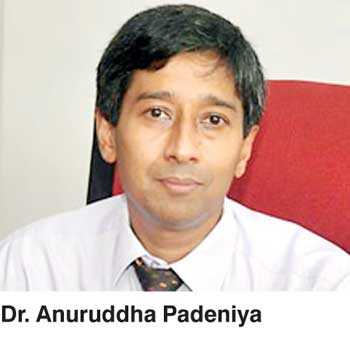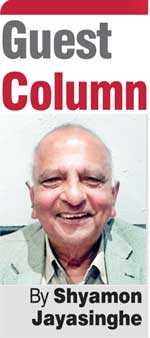Saturday Feb 21, 2026
Saturday Feb 21, 2026
Wednesday, 15 August 2018 00:10 - - {{hitsCtrl.values.hits}}
 Padeniya outburst
Padeniya outburst
That a political agenda lies behind the GMOA trade union actions is now beyond doubt. We had suspected this all along through the line of serial lightning strikes carried out by the doctors ever since the Yahapalanaya Government had been installed.
According to a Sunday Observer report, Dr. Anuruddha Padeniya, provoked by the fact that only half the private practitioners joined his strike, castigated some of the Lake House journalists who questioned him as “traitors” to the country. He is said to be preparing a list of such traitors employing some alleged psychiatric criteria that can measure traitor behaviour.
“We have created a point scheme,” Dr. Padeniya reportedly told a Lake House journalist. “In psychiatry there is a method to identify people who betray the country. We are going to launch this list and keep it online with the materials you publish. So we can display that you are carrying out a contract.”
In normal politico-polemical game-play, if you are opposed to my views I can call you a traitor. In the context we refer to, the ‘traitor’ impliedly and allegedly carries out or espouses a stance that is deemed detrimental to the country.
Policy development a task of the Government
This is clearly and unashamedly a political statement of serious proportions made by the President of the GMOA, which is purportedly a civil trade union established to protect and foster the trade union rights of its members. Policy development with regard to the economic direction of Sri Lanka is the responsibility and task of the Government of Sri Lanka and the Parliament of lawmakers. This is how democracy can work anywhere.
Political parties present policies to the electorate and electors (the people) vote for their preferred political party and bloc. On this basis, presidents and parliaments and governments get elected under a democracy. Even after elections, good governments always consider the views of other stakeholders outside the political spectrum during the process of policy work-in-progress. This is because a government and parliament must incessantly be in tune with the people.
However, after the obligation to consult is implemented, governments have to be left to make the final decision. No democracy can function and no society can sustain in any other way.
Outstepping its legitimate mark
In the GMOA we have a body that is supposedly a trade union but which has increasingly outstepped its legitimate mark and is becoming threatening to any popularly-elected government. The source of their power is the indispensability of doctors to the existential life of the people.
This indispensability is something non-substitutable at least in the short run. Doctors, unlike bus strikers, work on the life and death process line of human beings. This objective locale of their role has endowed their profession with a responsibility that stands transcendently above other workers. Simultaneously, doctors derive their specially-respected social status from that. If doctors decide to transgress their trade union legitimacy and to rival the power of the government, a political struggle would ensue between doctors and non-doctors and the large question of who rules pops up. This has to be seriously taken note of.
Right now the leadership of the GMOA is perceived as being behind the former political regime. It is easy for politicians of that regime to be content with this state of affairs. On the other hand, the power of indispensability can sooner or later strike the former regime players if they get to power. Thus the threat of GMOA political power is something to be viewed with apprehension by all political leaders whether in Government or in Opposition.
It is something not acceptable by civilised society and hence everyone must take note of this unusual development in Sri Lanka. The relevance of a people’s verdict is brought into question. This is where bipartisan support is required to save democracy for everyone –now ruling or later – to rule. The imbalance of power in our society that doctors have created is a veritable threat to democratic politics.
In other words, a new form of governance is emerging in Sri Lanka, which is also a first in world history. This is medicocracy or government by consent of the medicos. Under this system, doctors don’t directly govern but they restrict the options of the popularly-elected government and can potentially come down on the government on any public policy issue.
It is a form of governance where people’s sovereignty is restricted by a privileged section of society. The sovereignty is rather similar to that prevailing in a feudal order of society. Have you heard of this political development anywhere else? I wish the GMOA did transcend like this when the former Government was suspected of numerous murders and disappearances of dissentients.
Demands that are political
The GMOA has already put its fingers on the wide macro-economic issue of the Government’s policy of forming international trade agreements. It has openly come on media and protested and struck work on this issue. The recent strike also embedded this protest.
Now, whether or not and how our country must draw up international agreements isn’t a job for the GMOA – especially when the Government had assured there would be no clauses that would affect their members. Government must take the step after a serious reflection of the benefits or otherwise such an agreement can have on the country’s economy. GMOA had no business putting its neck out on this. Yet, that organisation keeps making all sorts of economic analyses on the issue; medical men cannot lay claim to a knowledge of practical global economics.
 Their current demands also include a number or proposals for salary increases. They include demands for a monthly transport allowance of Rs. 100,000 and a monthly allowance of Rs. 30,000 each for all medical administrators. There are about 20,000 doctors in the service. One can see what a formidable budget commitment that would all be. There is also a demand that that children of GMOA members be guaranteed entrance to top level national schools.
Their current demands also include a number or proposals for salary increases. They include demands for a monthly transport allowance of Rs. 100,000 and a monthly allowance of Rs. 30,000 each for all medical administrators. There are about 20,000 doctors in the service. One can see what a formidable budget commitment that would all be. There is also a demand that that children of GMOA members be guaranteed entrance to top level national schools.
These proposals if allowed could lead to vast demands and tensions across other sectors of society that would create a myriad of endless ramifications. From this impact even seemingly legitimate proposals would be deemed to have a political dimension as they stem from a consciousness of power and a will to exercise such power on the part of the medical fraternity.
The Government has now set up a salaries commission to revise salaries across the board for all sectors fairly and according to affordability. This is good. On the other hand, if the GMOA presses further on this path using its indispensability power to try and bring the Government to its knees, then it clearly plays a political role. In this way, otherwise legitimate demands of a union can border on politics.
Political rhetoric of the GMOA
Besides, one has to view all the above demands through the prism of the GMOA rhetoric. The rhetoric is threatening and unashamedly political. Dr. Anuruddha Padeniya’s threat to list traitors [to the nation] is political. He will have a hard time defining who a traitor to the nation is, in the first place. That issue is, however beside the point.
Social contract
In the recent railway strike one witnessed signs of the incoming power struggle that we referred to above. Commuters arrived in hordes after work and, provoked by the lightning strike, began beating the strikers. That was clearly a spontaneous act, according to all reports. Commuters arrived after a hard day’s work to get back to their homes but found to their dismay that trains weren’t going to work.
GMOA and other trade unions must realise one thing and that is that they are an integral part of the wider society to which they are obligated. Citizens are in an implied social contract. They can do what they do so far as they are loyal to those societal obligations and so far as the patience of the civilian population are not exceeded by what is perceived as a blatant breach of social contract.
(The writer can be reached via [email protected].)